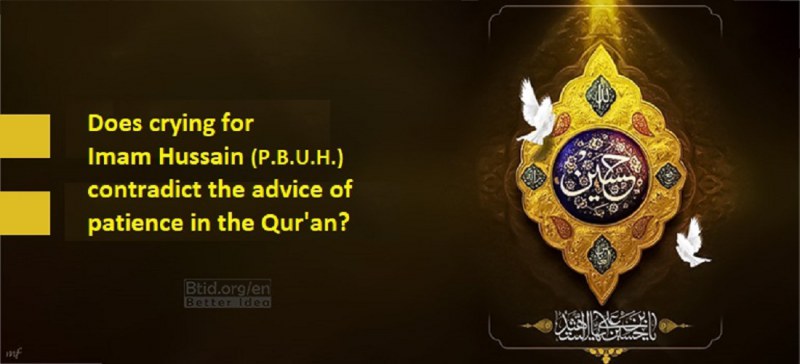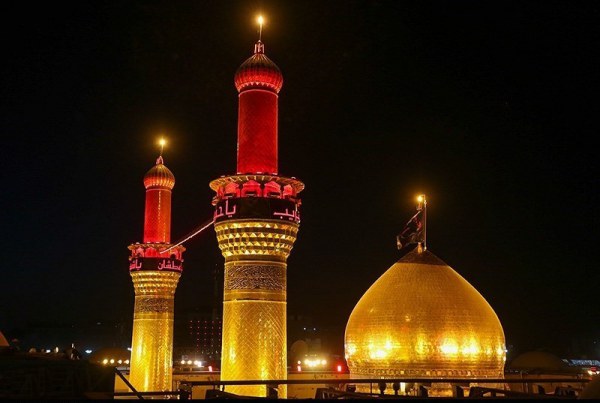When Muharram (the month of mourning for Imam Hussain (P.B.U.H.) arrives, the lovers of Imam Hussain (P.B.U.H.) hold mourning ceremonies and cry for Imam Hussain (P.B.U.H.). However, a group of Wahhabi people blame them and say to them: “Aren’t you Muslims?! The Holy Qur’an orders us to be patient and tolerant in tragedies and calamities and gives good tidings to the patient. So, why do you not tolerate the mourning of Imam Hussain (P.B.U.H.)?”

Does crying for Imam Hussain (P.B.U.H.) contradict the advice of patience in the Qur'an? [1]
Patience and its derivatives have been mentioned more than a hundred times in the Quran. Some of the uses of this word have come with some expressions and phrases in the Holy Qur’an. For instance, in 4 verses of the Holy Qur’an, after Allah points to some signs of Him, He said: “In deed, in these (verses), there are some signs for those who are patient and grateful”. [2] Or in one of the verses of the Holy Qur’an, after expressing the story of the prophet Ya’qoob (P.B.U.H.), Allah says: “Surely, we found him (Ya’qoob) tolerant. What a good servant!”. [3] In other verses of the Holy Qur’an, Allah said: “And Allah is with the patient”.[4] Many other various and abundant phrases have also been mentioned in the praise of “patience” in the Holy Qur’an.
When Muharram (the month of mourning for Imam Hussain (P.B.U.H.) arrives, the lovers of Imam Hussain (P.B.U.H.) hold mourning ceremonies and they weep and cry for Imam Hussain (P.B.U.H.). However, a group of Wahhabi people blame them. They (without thinking and without having reflection) cite to some verses of the Holy Qur’an and say to the followers of Imam Hussain (P.B.U.H.): “Aren’t you Muslims and followers of Qur’an?! The Holy Qur’an orders us to be patient and tolerant in tragedies and calamities and gives good tidings to the patient. So, why do you not tolerate in the mourning of Imam Hussain (P.B.U.H.)?”

In response to this question, it must be said Yes! We are Muslims. We believe in the patience and the good tidings of the Holy Qur’an. Yet, the behavior of a Muslim who is the lover of Imam Hussain (P.B.U.H.) and cries and mourning for Imam Hussain (P.B.U.H.) (due to Imam Hussain’s not being assisted sufficiently) does not contradict patience. Patience does not mean not weeping or not being sad. But patience means self-control or resistance.
Patience means not to exit the divine commands and not to act in a way that is outside the domain of monotheism. Thus, if someone protests, s/he is not patient. If someone hurts him/herself, s/he is not patient. Yet, do crying and making people cry (for Imam Hussain (P.B.U.H.)) contradict patience?! Definitely not.
A historical instance
The Holy Prophet (P.B.U.H.) who the Holy Qur’an was a revelation to and is the first doer of it, cries and make people cry over his mother’s grave. Does this behavior of the Holy Prophet (P.B.U.H.) contradict the Qur’anic patience?! No.
It has been mentioned in Sahih book of Moslem:
The Holy Prophet (P.B.U.H.) made a pilgrimage to his mother’s grave and cried by her grave and made people around him cry and said: “I have gotten permission from my God to make a pilgrimage of my mother’s grave. Make a pilgrimage to the graves, too. Because to make a pilgrimage of them reminds you of God." [5]
Conclusion
In conclusion, there is no contradiction between patience and crying. Patience means to be satisfied to what God has determined and not to protest against God. Therefore, Crying is due to the emotion of a person who cries from the bottom of his/her heart over losing someone.
References:
[1]. Reference: btid.org/fa
[2]. The Holy Qur’an, chapter Ibrahim, verse 5
[3]. The Holy Qur’an, chapter Sad, verse 44
[4]. The Holy Qur’an, chapter Baqarah, verse 249
[5]. Sahih, Moslem, vol. 3, chapter “Isti’zan al-Nabi Rabbahu Azza Wa Jall Fi Ziyarat-e-Qabr-e-Ummeh”, p. 6



